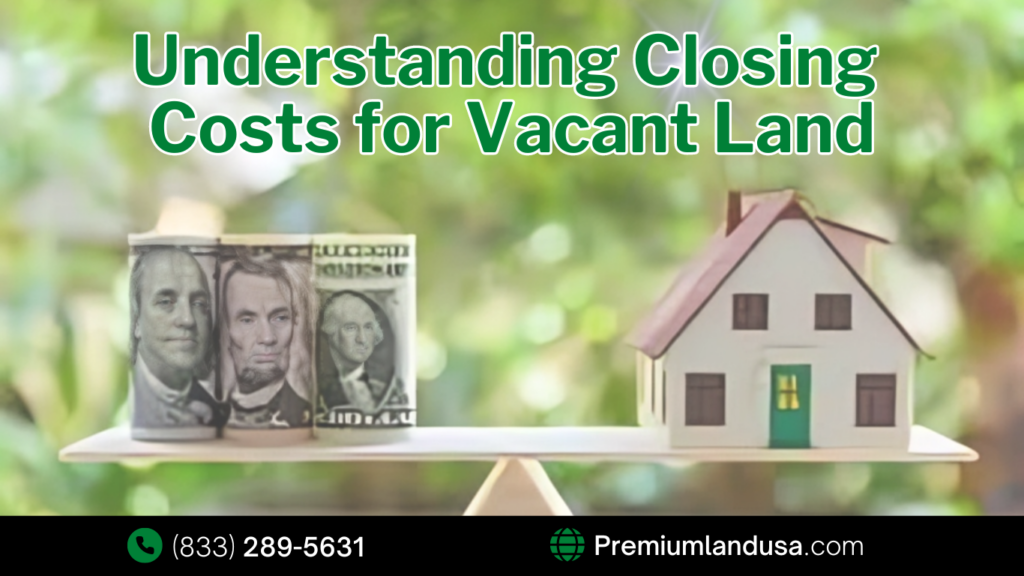Purchasing vacant land can be a great investment or the perfect site for your future home. However, beyond the purchase price of the property, there are additional costs involved in closing the deal. Understanding these closing costs can help you budget more accurately and avoid surprises. In this blog, we’ll break down what’s typically included in closing costs for vacant land and provide an overview of how much you can expect to pay.
What’s Included in Closing Costs for Vacant Land
1.Title Insurance
Title insurance protects you and your lender from potential issues with the land’s title, such as undisclosed liens or ownership disputes. It ensures that you have clear, undisputed ownership of the property.
Cost: Generally, title insurance for vacant land costs between $500 and $1,500, depending on the property’s value and location.
2. Title Search
A title search is conducted to verify the ownership history of the property and check for any outstanding liens or claims. This step is crucial to ensure that the seller has the right to sell the land and that there are no legal obstacles to your ownership.
Cost: A title search typically costs between $200 and $400.
3. Survey Costs
A land survey provides an accurate map of the property’s boundaries and any existing structures or easements. This can be especially important for determining property lines and avoiding future disputes.
Cost: Surveys can range from $300 to $1,000, depending on the land’s size, location, and complexity.
4. Escrow Fees
Escrow fees cover the cost of a neutral third party who manages the closing process, ensuring that all terms of the sale are met before transferring ownership. The escrow agent holds funds and documents until all conditions are satisfied.
Cost: Escrow fees usually range from $300 to $700.
5. Recording Fees
Recording fees are charged by the local government to officially record the deed of the property in your name. This step is necessary to make your ownership of the land a matter of public record.
Cost: Recording fees generally range from $50 to $150, depending on the county.
6. Transfer Taxes
Transfer taxes are imposed by the state or local government on the transfer of property ownership. The rate varies by location and can be a percentage of the purchase price.
Cost: Transfer taxes can range from 0.1% to 2% of the purchase price, depending on your location.
7. Property Taxes
Depending on the timing of the purchase, you might need to pay a portion of the property taxes that are due. Sellers often provide a prorated amount based on the closing date.
Cost: The amount will vary based on the property’s assessed value and local tax rates.
8. Legal Fees
If you choose to hire an attorney to assist with the transaction, their fees will be part of the closing costs. An attorney can help review documents and ensure that all legal aspects of the transaction are handled properly.
Cost: Legal fees typically range from $500 to $1,500.
9. Loan Fees (If Applicable)
If you are financing the land purchase, you may incur additional loan-related fees such as application fees, appraisal fees, and underwriting fees.
Cost: Loan fees can vary widely but generally range from 1% to 3% of the loan amount.
How Much Can You Expect to Pay?
The total closing costs for vacant land typically range from 2% to 5% of the purchase price. Here’s a rough estimate based on a $100,000 property:
Title Insurance: $500 to $1,500
Title Search: $200 to $400
Survey: $300 to $1,000
Escrow Fees: $300 to $700
Recording Fees: $50 to $150
Transfer Taxes: $100 to $2,000 (varies widely)
Property Taxes: Varies based on local rates
Legal Fees: $500 to $1,500
Loan Fees: 1% to 3% of the loan amount (if financing)
In total, you might expect to pay between $2,450 and $7,250 in closing costs for a $100,000 piece of vacant land. Keep in mind that these figures can vary depending on the specifics of the transaction and local regulations.
Tips for Managing Closing Costs
1. Get a Detailed Estimate: Request a Good Faith Estimate (GFE) or Loan Estimate from your lender or real estate agent to understand all potential closing costs.
2. Negotiate: Some closing costs may be negotiable. Discuss with the seller or your agent to see if they are willing to cover certain fees.
3. Shop Around: Compare fees from different title companies, surveyors, and escrow agents to ensure you’re getting a fair deal.
4. Budget for Surprises: It’s wise to set aside a bit more than the estimated closing costs to cover any unexpected expenses that may arise.
Final Thoughts
Closing costs for vacant land encompass several fees and expenses beyond the purchase price, including title insurance, surveys, and recording fees. By understanding these costs and budgeting accordingly, you can ensure a smoother and more predictable land-buying experience. Always work closely with real estate professionals to get accurate estimates and manage costs effectively, so you can focus on enjoying your new property.
References:
(U.S. News)
(HomeLight)
(Forbes)

